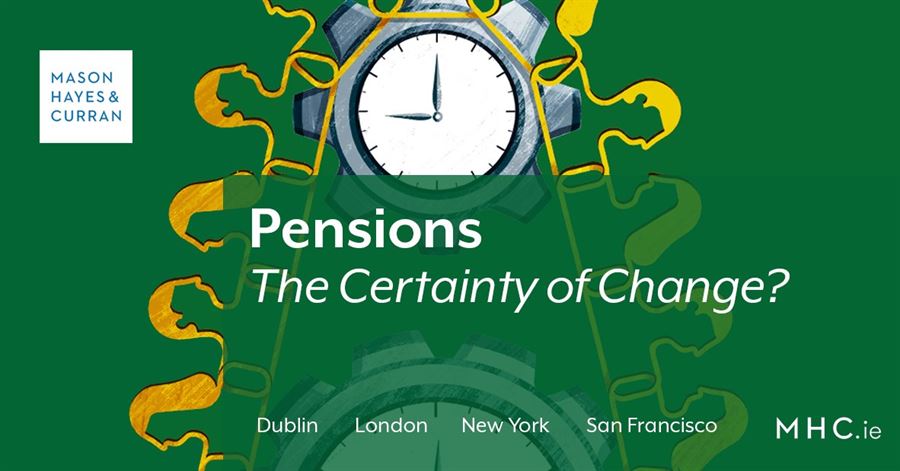
We review the main pensions’ developments of 2019. We will look at the recent update by the Department for Employment Affairs and Social Protection (the Department) on the proposed Automatic Enrolment (AE) pensions system. We will also provide an update on the ongoing judicial review proceedings relating to the transposition into Irish law of the European IORP II Pensions Directive as well as the somewhat controversial European Union (Supplementary Pension Rights) Regulations. Finally, we will look briefly at the ongoing confusion surrounding the application of the European Union (Anti-Money Laundering: Beneficial Ownership of Trusts) Regulations 2019 (the AML Regulations) to pensions.
The Department’s automatic enrolment update

The update that was provided by the Department leaves some questions unanswered. It is silent on the level of State contribution, how death benefits will be dealt with and it also leaves a lingering doubt as to the adequacy of the retirement benefits that AE will provide. The projected timeline anticipates that draft legislation will be put place by late 2020 and enrolments will begin in 2022. Before this occurs, a State contribution level will need to be proposed and AE’s relationship with the existing pensions’ tax relief system must be considered. The prescribed minimum standards that existing pension schemes must satisfy will need to be established and a further consultation period with stakeholders may be necessary.
The existence of a functioning AE system operating on a large scale should weaken overall reliance on the State contributory pension. Arguments might be made in the future that the annual contributions made by the employee, their employer and the State to the AE system are sufficient and that the very expensive State pension could be diluted in value over time as the AE system beds in. The Government should be commended in pushing ahead with AE and for engaging in the consultation process, but significant questions remain unanswered. For more on this topic, click here
IORP II
The Pensions industry is eagerly tracking the progress of judicial review proceedings that were brought in March 2019 by the Association of Pension Trustees of Ireland (APTI). The proceedings were taken against the Minister for Employment Affairs and Social Protection (the Minister) and the Attorney General. They related to the transposition of a significant European Directive, known as the IORP II Directive, into Irish law and its proposed application to single member pension schemes.
It is expected that APTI will seek to recommence proceedings if the proposed transposing regulations do not include an exemption for single member pension schemes. Mr Justice Simons has confirmed that he will continue to hear the matter if and when it recommences. The pensions industry will be watching developments closely as it is not clear which path the Minister will choose. If the Minister chooses to discontinue the exemption for single member pension schemes there is the possibility that the application for judicial review by the APTI will fail and providers of single member schemes will need to carefully consider the outcome of these proceedings. We review this development in more detail here
The Supplementary Regulations
The Supplementary Regulations became effective in September 2019 and have made various changes to the Pensions Act 1990. The aim of the Supplementary Regulations is to give further effect to Directive 2014/50, which seeks to enhance worker mobility between Member States.
While the 2014 Directive explicitly excludes certain scheme types from its application, the Supplementary Regulations conversely cater for all scheme types. This has led to confusion in the pensions industry as to whether the Supplementary Regulations cover schemes already closed for membership, single member arrangements and what members can be classified as “outgoing workers”. The confusion over this piece of legislation is already having an adverse impact on the ability of trustees to affect transfers from schemes.
At the time of writing, the Pensions Authority has published a guidance note on the Supplementary Regulations. It states that it will not be possible for employers to determine if a member leaving service is an “outgoing worker” where that member is not immediately taking up new employment. It suggests that trustees will need to follow-up with ex-employees to ascertain whether they become outgoing workers for the purposes of the Supplementary Regulations. This requirement will add to the administrative burden and any additional costs that arise will be borne by active and deferred members of the scheme. Employers will need to consider how the Supplementary Regulations are likely to affect a scheme’s vesting rules and its liabilities in the future, but for the moment confusion reigns. Click here to read more on this topic.
The AML Regulations
The AML Regulations became effective from January 2019 and have introduced a set of onerous tasks for trustees, given the nature of trust based pension schemes, in particular their inclination towards having numerous and varied beneficial owners. Identification of beneficiaries will be a challenge for trustees, before even considering the requirement to then collate data. In light of modern awareness of data protection and the potential for employees to be considered beneficial owners, the availability of this information on a register may cause sensitive issues for both trustees and employers. The obligation to inform must also be carefully considered by trustees, as it may impact on the ability to engage commercial services for the scheme
2019 – Taking Stock
The auto enrolment update from the Department gave a clear signal that this Government plans to continue with its implementation as part of its Roadmap for Pensions Reform, published in 2018. Employers should begin to budget for the cost of contributions and those that offer a pension to employees should consider the potential costs in taking financial and legal advice for the review and update of such arrangements to make them AE compliant. In anticipation of the IORP II implementing regulations, it is recommended that trustees and providers associated with single member pension schemes consider reviewing their investment, compliance and scheme administration procedures now and obtain legal advice if it is deemed necessary.
2020 – Looking Forward
Draft auto enrolment legislation is expected in 2020. We expect to see some certainty on the proposed level of State contribution, the details of the minimum standards required for existing schemes and other necessary elements that the Department’s update was silent on. We may see significant changes in the single member pensions industry if an exemption is not included in the IORP II implementing regulations and the proceedings taken by the APTI fail.
If that occurs, many providers of single member pensions are likely to focus on those savings and investment products that are not captured by the implementing regulations. Members of single member pensions will also need to monitor the increased annual costs of maintaining their pension once the implementing regulations are in place.
Careful interpretation of the Pensions Authority’s guidance note on the Supplemental Regulations will be required to ensure that employers and trustees are compliant and processes will need to be put in place to allow trustees to establish if any members leaving service are to be considered “outgoing workers”. The Authority’s guidance note contains very little detail on the tax treatment of refunds payable to members affected by the Supplemental Regulations and perhaps Revenue guidance will be forthcoming on this point in 2020.
Clarification is also expected from the Central Bank of Ireland which will allow trustees to act with certainty in deciding who the pension scheme’s beneficiaries are for the purposes of the AML Regulations and to collate the appropriate data.
To discuss these topics and their likely impact on your scheme during 2020, contact a member of our Pensions team.
The content of this article is provided for information purposes only and does not constitute legal or other advice.






